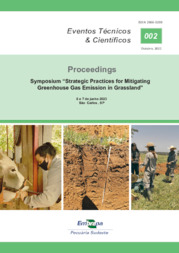Proceedings...
Proceedings...
Summary: The accumulation of greenhouse gases (GHG) in the atmosphere remains an important topic of scientific and public interest. The increase in these gases has been considered to be a major cause of global warming. In this context, agriculture, especially Brazilian livestock production, has been the target of numerous criticisms related to global warming. Appropriate agricultural practices can reduce GHG emissions and improve the sustainability of the cattle industry, being the manipulation of ruminal fermentation and the increase in the sequestration of C strategic technologies for Brazil. In this regard, this project has been implemented through the collaborative work of 4 institutions: 1) The Brazilian Agricultural Research Corporation - EMBRAPA (EMBRAPA Livestock Southeast, EMBRAPA Instrumentation and EMBRAPA Environment); 2) The University of São Paulo-USP (College of Veterinary Medicine and Animal Science, College of Animal Science and Food Engineering and Center of Nuclear Energy in Agriculture); 3) The São Paulo Agency for Agribusiness Technology APTA (Institute of Animal Science), and 4) The University of California (Davis). The project itself consisted of an experimental component and a data processing component. The experimental component aimed to evaluate different GHG mitigation strategies within the following contexts: 1) characterization of pasture productive components, 2) rumen metabolism and metagenomics; 3) animal performance and dry matter intake; 4) meat quality; 5) ruminal methane and soil GHG flux, and 6) the dynamics of organic matter and carbon stock in soil. The experimental component consisted of four trials: 1) the effects of grazing intensification and integration (integrated crop-livestock-forestry); 2) the use of pigeon pea bean in degraded pastures; 3) grass and legume intercropping for biological nitrogen fixation (BNF) of the soil, and 4) deferred grazing as a strategy for GHG mitigation. After the development of these experiments, it was identified - from among the systems currently available - those that have the greatest potential for GHG mitigation increasing soil carbon stocks. This project resulted in the training of 25 students (seven in technical training, eight in master's, seven in doctorate and three in post-doctorate degrees) and in the production of more than 60 technical-scientific publications, 12 of which are scientific articles, seven master's dissertations, seven doctoral theses, two book chapters and several abstracts in scientific events. We gratefully acknowledge São Paulo Research Foundation (FAPESP), for funding this project (grant numbers #2017/20084-5) and EMBRAPA, USP, IZ and DAVIS University for the development of the study.
Publication year: 2023
Types of publication: Booklets
Keywords: Animal performance, Carbon stock in soil, Degraded pastures, Dynamics of organic matter, GEE, GHG, Grass, Greenhouse gases, Integrated crop livestock forestry, Legume intercropping for biological nitrogen fixation, Meat quality, Metagenomics, Mitigation strategies, Pasture productive, Pigeon pea bean, Rumen metabolism, Ruminal methane, Soil GHG flux, Strategy for GHG mitigation, Sustainability of the cattle industry
Observation
Some of Embrapa's publications are published as ePub files. To read them, use or download one of the following free software options to your computer or mobile device. Android: Google Play Books; IOS: iBooks; Windows and Linux: Calibre.
Access other publications
Access the Agricultural Research Database (BDPA) to consult Embrapa's full library collection and records.
Visit Embrapa Bookstore to purchase books and other publications sold by Embrapa.

